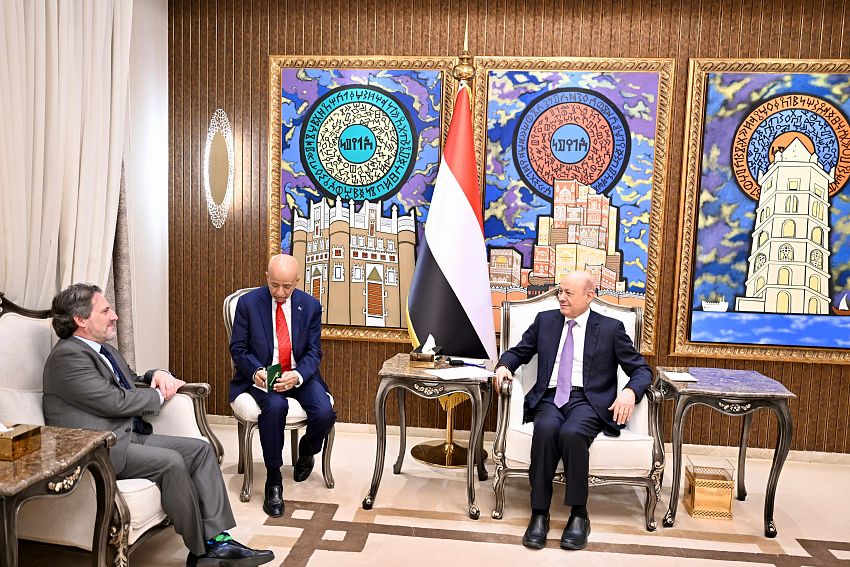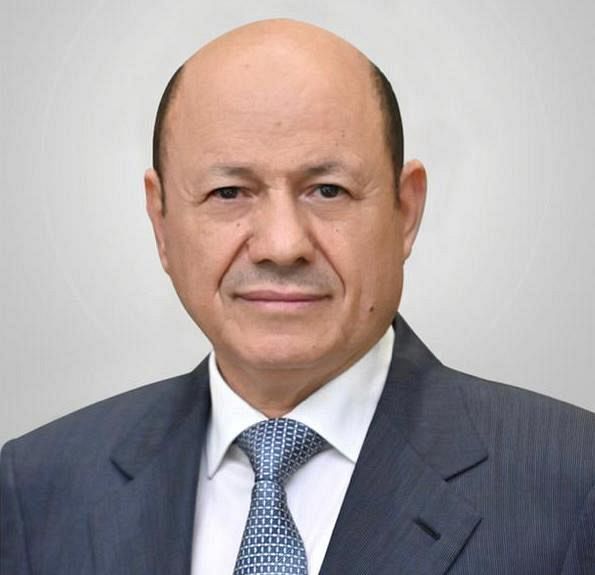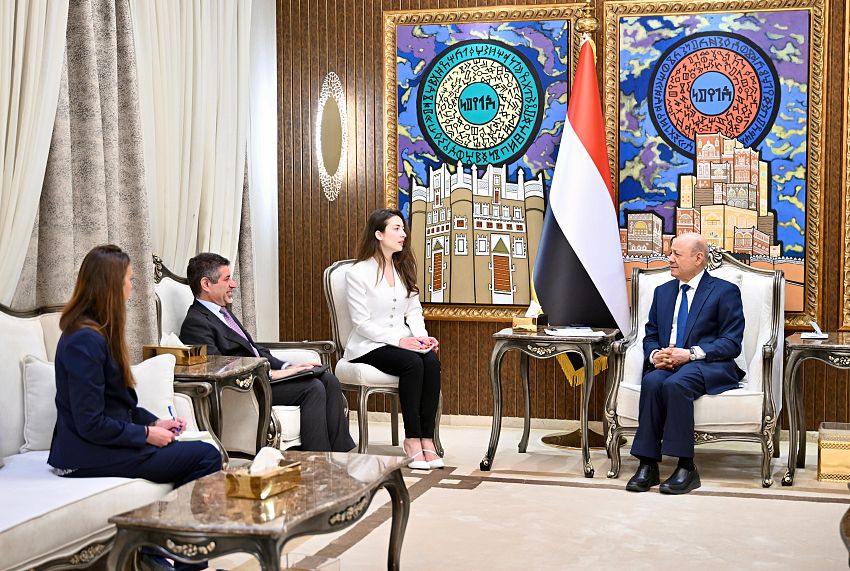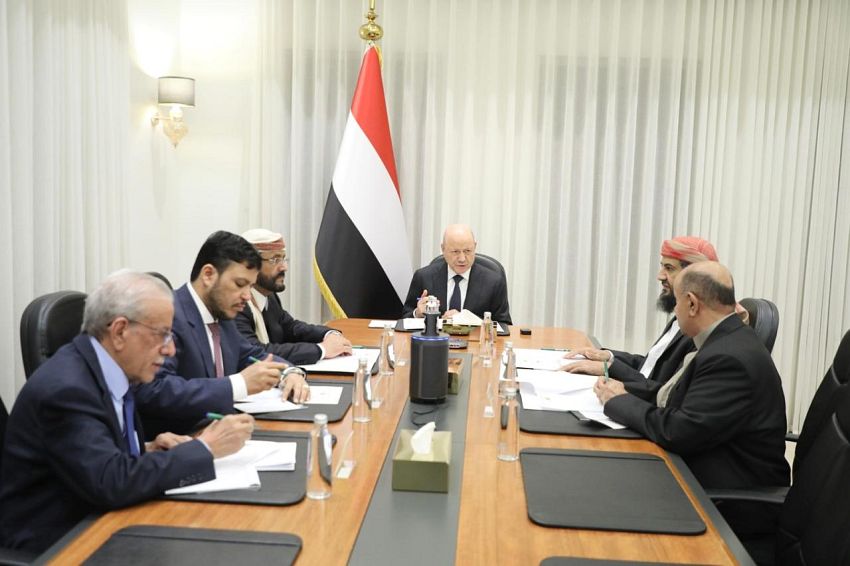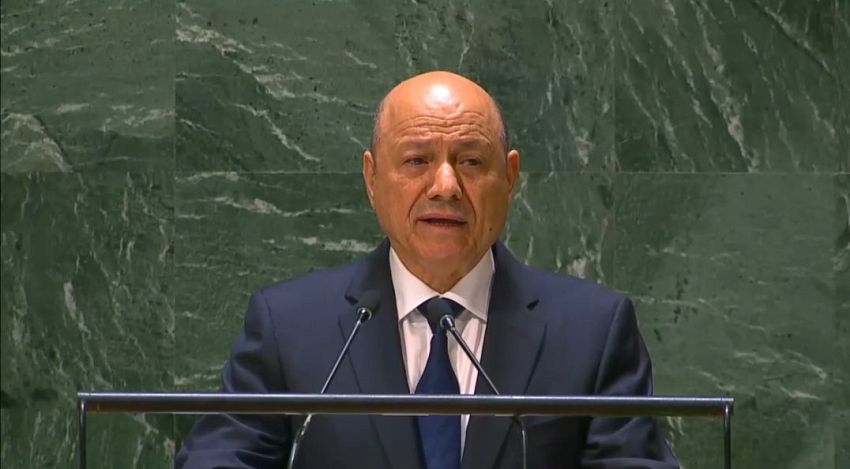
Thu ، 21 Sep 2023 16:47
New York
President of the Presidential Leadership Council, Dr. Rashad Al-Alimi, delivered a speech before the seventy-eighth session of the United Nations General Assembly in New York, in which he said:
His Excellency Mr. Denis Francis, President of the 78th United Nations General Assembly,
His Excellency Mr. António Guterres, Secretary-General of the United Nations,
Your Majesties, Excellencies, Highnesses and Excellencies,
Ladies and Gentlemen,
Firstly, I would like to congratulate Mr. Dennis Francis on his election as President of the United Nations General Assembly for the seventy-eighth session, wishing him success in his great tasks and appreciating the role played by his predecessor, Mr. Csaba Korosi, in his efforts in administering the Assembly during the last session.
Let me also commend the role of the Secretary-General of the United Nations, Antonio Guterres, in strengthening the presence of the United Nations amidst all these complex global challenges and crises, and his vision regarding the future of international cooperation based on multilateralism and their integration to maintain international peace, security, and develop friendly relations between nations.
Allow me also to take this opportunity to extend my sincere congratulations to our great Yemeni people who are celebrating their national holidays in conjunction with the holding of this high meeting. This national day which brought Yemen out of the yoke of tyranny, illiteracy, and backwardness into the realm of freedom, justice, and the elimination of differences and discrimination between classes.
Perhaps it was a misjudgment by the militias who chose their ill-fated coup against the national consensus on this day of the month when the Yemenis set fire to celebrate the anniversary of their Republic and the fall of the backward, priestly Imamate rule.
Mr. President, Ladies and Gentlemen, this new session of the United Nations General Assembly is being held under extremely complex geopolitical, economic, and climatic conditions and challenges, which requires from all of us innovative solutions, and changing our traditional mechanisms for approaching these challenges, first and foremost is ending the long- standing suffering of our Yemeni people.
Perhaps the slogan of this session was carefully designed to embrace the demands of our peoples and governments, to rebuild trust in our national and international institutions, to ignite global solidarity in support of the goals of sustainable development towards peace, prosperity and progress for all. This is what we need, my fellow members of the Presidential Leadership Council, the government, and the Yemeni people, to praise the solidarity and unified position of the international community in support of constitutional legitimacy, Yemen’s sovereignty and independence, its territorial integrity, and the non-interference in its internal affairs.
While we value this unified political position of the international community towards the Yemeni issue, we bring to mind what can embody the slogan of this session of solidarity of our brothers in the coalition to support legitimacy led by the Kingdom of Saudi Arabia and the United Arab Emirates, whose stances represented a strong fence to prevent the collapse of the Yemeni state institutions, and to strengthen its steadfastness in the face of the Houthi militias supported by the Guardian Jurist regime in Iran, and the terrorist organizations allied with it.
Mr. President, ladies and gentlemen, since I am addressing you today in this hall for the second time as President of the Presidential Leadership Council of the Republic of Yemen, allow me to brief you on the current scene, and the points of progress and failure in my country afflicted by the war of the Houthi militias supported by the Iranian regime.
Over the past months, the Yemeni government, with the support of brothers and friends, has continued to fulfill its inevitable obligations, including regular payment of employee salaries, saving millions of lives, and helping those trapped in some areas of armed conflicts and internal and external disasters in a purely national and moral mission that is not the concern of the militias.
In the midst of the worst humanitarian crisis in the world, we coordinated our full, unilateral response to alleviate the suffering, and adhered to the terms of the truce sponsored by the United Nations, starting with facilitating the arrival of fuel ships to ports forcefully under the control of militias, and resuming flights through Sana’a International Airport and expanding them to new destinations.
We also maintained relative stability in the national currency and the prices of basic commodities, despite the disastrous repercussions of the Houthi militia attacks on oil installations and the suspension of export for a whole year.
Despite the fluctuation of exchange rates in the liberated governorates, the fact is that evaluating the prices of basic commodities in foreign currencies is much better than in areas under militia control, which receive three times the resources of the legitimate government.
We have given the main social groups, such as women, greater representation when we appointed the first woman to the Supreme Judicial Council, and then eight others to the Supreme Court for the first time in the country’s history.
We also helped, with an appreciated event by the international community, in avoiding the most dangerous environmental disaster in the world by unconditionally facilitating the transfer of oil stock from the Safer tanker to an alternative one, and the government’s contribution of five million dollars to the cost of the new ship despite its limited resources. We will continue to support these efforts until the fuel shipment is sold and the danger ends completely.
Commitment to our constitutional and moral responsibilities, and our service initiatives and interventions, have helped feed millions, facilitate access to vaccines and life-saving medicines, provide local communities with security, and promote the discourse of development instead of slogans of hatred, war and devastation.
But on the other hand, there are still many heavy entitlements that exceed the capabilities of the Yemeni government, with the dominance of the war economy fueled by the militias, the influx of tens of thousands of illegal immigrants, and the effects of climate change that leave behind hundreds of victims annually, and destroyed agricultural lands. Which requires the International community’s assistance, and sharing us the burdens of these challenges.
Mr. President,
last year, my country witnessed a historic transformation, according to which the institutions of Yemeni legitimacy were rearranged, and a presidential council was formed, on the basis of strengthening partnership, establishing peace, and ending the war.
But despite this important national transformation, and the regional and international momentum to revive the political process, the peace file has remained stagnant, despite the concessions and initiatives made by the Yemeni government in support of this path.
With the resumption of the praiseworthy efforts of our brothers in the Kingdom of Saudi Arabia and the Sultanate of Oman, hopes are renewed for the Houthi militias to submit to the popular, regional and international will, and to recognize the fact that the state guarantor of rights and freedoms, and the rule of law enforcement on the basis of justice and equal citizenship, is the only one that will make our country safer, more stable, and more respected in its regional and international surroundings.
This is the logic of the legitimate government, and the ultimate goal of any efforts for sustainable peace, which must mean broad partnership without discrimination or exclusion, and the foundation for a brighter future.
Today, I do not believe that we in the government still have more concessions to offer, or to change our understanding of militias that we know well and whose intentions we can predict for decades to come.
If we do so, this approach will return our people to the eras of slavery, frustration, and oblivion. Indeed, our country is likely to turn into a hotbed for the export of terrorism, and a spark for a regional and international conflict that cannot be controlled through diplomatic means.
Therefore, any laxity on the part of the international community or neglect of the legal status of the state, or even dealing with the militias as a de facto authority, would make the practice of repression and the violation of public freedoms a behavior that cannot be eliminated in any way.
Through our understanding of the approach of the Houthi militias, peace proposals for them are nothing but test balloons, which should be dealt with from a tactical perspective to control more resources, and postpone the decision on military confrontation until better conditions are achieved, which is what happened in its repudiation of all previous agreements, the most recent of which Stockholm Agreement.
Therefore, we stress the necessity of providing adequate guarantees for sustainable peace, which must be based on the three terms of reference agreed upon nationally, regionally and internationally, and resorting to international legitimacy, as stated in the Saudi initiative.
In addition, sustainable peace must be based on justice, fairness, and addressing the effects of the past and the main outstanding issues of a national dimension.
Furthermore, any peace initiative or confidence-building measures should be able to achieve tangible and immediate results to alleviate the suffering of the Yemeni people, and benefit the victims of the conflict, especially women and children.
Moreover, the sustainability of peace, and the non-repetition of rounds of war, is the essence of the desired peace that guarantees Yemenis their ability to build a state of institutions that protects rights, freedoms, and equality among its citizens, and establishes good-neighborly relations and common interests with our brothers in the Gulf Cooperation Council countries.
But today I see that there is an available and more guaranteed path to achieving peace, and embodying the slogan of this session by restoring the Yemenis’ trust in international legitimacy and their local government.
This matter requires supporting the legitimate government and strengthening its ability to build the economy and provide services. This is the path that spares us all from dealing with militia blackmail, obstructing the implementation of international resolutions, and reviving hope for the better and bright tomorrow that UN envoys and mediators everywhere talk about.
I also believe that the mission of our international regime to protect global stability and peace, and to support the will of the peoples and their recognized national governments, is easier today than ever before with the ease of obtaining information and knowing the facts. However, giving interests greater weight than the will of the peoples may undermine more trust in this institution and the entire international community.
I say this not to shirk our national responsibilities and make the international community a peg for our failures, but rather because we believe that the position of the major powers in particular and their strict message to the militias, and the planners of coups against constitutional legitimacy, not only in Yemen but in all parts of the world, will make the path to peace clearer by dispelling the dreams of armed groups and those aspiring to power, and their illusions of creating entities who compete with legitimate governments and their exclusive powers.
Mr. President, Mr. Secretary-General, Ladies and Gentlemen,
in order to restore trust and improve the chances of progress in the Yemeni file, we must acknowledge that the existing path of international humanitarian interventions needs to be reconsidered, and radical treatments are required to be consistent with the principles of international law, and the warnings related to the financing of terrorism, rebellion and armed groups.
While we welcome the United Nations’ move towards moving the path of relief interventions in our country to the scope of sustainable development, this shift must include pumping international pledges and funds through the Central Bank of Yemen, to strengthen the position of the national currency, curb inflation, and ensure that these funds do not fall under the suspicion of unjust and indirect support to armed militias.
We must acknowledge the contradiction of this path of support with the international discourse that seeks an improvement in the indicators of the Yemeni economy, while its international operations go through institutions subject to force under the control of the Houthi militias, despite their arbitrary measures that violate the independence of the banking sector and the confidentiality of its dealings, and turn this sector into a laundering network for money and plundering the savings of public and private institutions, and depositors from all citizens.
Continuing this approach leaves UN member state institutions with weak readiness, a lack of funding, and insufficient resources to deal with cross-border challenges and the growing humanitarian needs in the country.
In addition, these policies threaten to fuel the war economy, and allow the flow of money and pledges through banking outlets that are not subject to accountability and effective oversight.
The humanitarian aid interventions provided by the government today prove that its support in improving basic services would make the lives of millions men, women and children better, in addition to enhancing the chances of peace by mobilizing people around their interests in development and prosperity, and not the slogans of violence, death and hatred followed by the Houthi militias.
Mr. President, distinguished delegates,
I said from this podium last year that the more the international community delays another year in presenting a firm stance on the Yemeni file, the more massive the losses will be, and the more dangerous the militias and terrorist groups will be in their cross-border threats. As well as its horrific violations of human rights, around which our nations have united under the umbrella of this international institution for more than seventy years.
Indeed, this year we are witnessing a rapid growth in the risk of threats from Al-Qaeda and ISIS, which are fueled by the Houthi militias and the Iranian regime with money, weapons, and intelligence support, sharing with them the same Takfiri ideology. When I spoke to you a year ago from this podium, the state’s general budget was achieving the best indicators since the outbreak of war. We launched promising programs to improve services and create job opportunities, but that momentum was halted and continues to be halted by the Houthi terrorist attacks on oil installations, which put the country on the brink of a comprehensive humanitarian crisis.
I find it an opportunity to say that had it not been for the generous support that the government received last month from our brothers in the Kingdom of Saudi Arabia, through a financial grant worth one billion and two hundred million dollars in support of the state’s general budget, the government would have been unable to fulfill its basic obligations, including the inability to pay employee salaries. In this context, we also note the humanitarian and development funding and pledges from our brothers in the United Arab Emirates, friends in the United States of America, the European Union countries, the United Kingdom, and the rest of the regional and international partners.
Despite all these humanitarian interventions, I reaffirmed that the Houthi militias have recently escalated their threats to target maritime shipping lines in the Red Sea, Bab al-Mandab, and the Gulf of Aden, considering them military zones, hinting at testing new weapons on the Yemeni islands and targeting commercial ships and oil tankers, which confirms the continuation of these militias and the Iranian regime behind them to destabilize the security and stability in the region, undermine efforts to calm the situation, and thwart efforts to renew the truce and resume the political process.
Here we reiterate the importance of ensuring freedom of international navigation, combating extremism, terrorism, piracy, and supporting measures aimed at preventing the spread of nuclear weapons and other weapons of mass destruction, most notably Iran’s nuclear program, its ballistic missiles, and its destructive role in the region.
We also renew our call on the international community to condemn the blatant Iranian interference in the affairs of our country, which turned it into a platform for a cross-border threat. We also call on the international community to subject Iran to the sanctions approved in accordance with international legitimacy resolutions related to the Yemeni file.
In this context, we call on member states to adhere to the arms embargo, confront Iran’s destabilizing influence, and prevent it from providing its militias with military technologies such as ballistic missiles and drones, which are used to commit terrorist acts against innocent civilians.
Mr. President, Distinguished Delegates, the Presidential Leadership Council and the government confirm their strict commitment to all international agreements and treaties, including protecting children and preventing their involvement in armed conflict. We are also committed to providing the necessary guarantees for the work of international organizations, and facilitating the access of their interventions to those eligible in various parts of Yemen.
To strengthen these efforts, the government is working to enable the Independent National Commission to investigate allegations of human rights violations, and the relevant international and UN mechanisms to fulfill their tasks unconditionally, which leads us to point out that all the understandings that the United Nations agencies signed with the Houthi militias did not even come to its way to implementation, as the militia continues to recruit children and mobilize them to combat camps in full view of the international community.
We also notice daily the Houthi militias’ gross violations of human rights, including restrictions on travel, work, women’s education, and suppression of journalists.
Mr. President, Ladies and Gentlemen, the Republic of Yemen affirms its firm stance towards the Palestinian issue, and to advance the peace process towards a just and comprehensive solution to the issue on the basis of international legitimacy resolutions and the Arab Peace Initiative, in a way that guarantees the right of the Palestinian people to establish their independent state.
We also affirm our support for all efforts aimed at bringing peace to Sudan, foremost among which are the efforts of the Kingdom of Saudi Arabia, the Arab Republic of Egypt, and the United States, to restore security, stability, and development to this dear country.
I also express my full solidarity and sincere condolences to the brothers in Libya and the Kingdom of Morocco for the victims of the tornado and devastating earthquakes that struck the two brotherly countries, as the risks of climate change threaten our global system.
Thank you.. May God’s peace, mercy, and blessings be upon you

